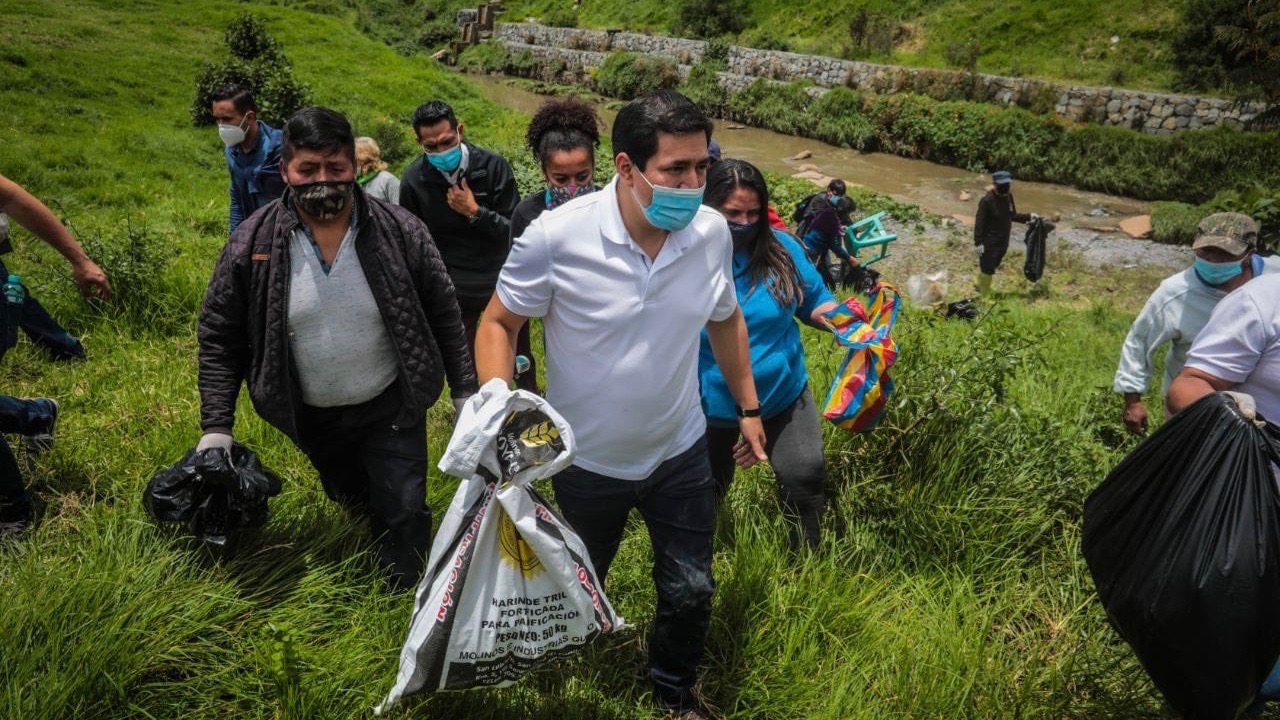The election campaign for the second round of presidential election in Ecuador began on March 16. In the run-off on April 11, Andrés Arauz of the progressive Union for Hope alliance (UNES) will face off Guillermo Lasso of the right-wing Creating Opportunities party (CREO) and Social Christian Party (PSC).
According to the schedule set by the National Electoral Council (CNE), the candidates will have until April 8 to promote their plans and proposals for the new government. This Sunday, on March 21, they will take part in an official and mandatory debate organized by the CNE in the city of Guayaquil.
35-year-old economist Arauz won the first round of elections, held on February 7, with 32.72% of the votes. Meanwhile, 65-year-old banker businessman Lasso obtained 19.74 % of the votes, beating with a narrow margin Indigenous leader Yaku Pérez of the Pachakutik Plurinational Unity Movement, who secured 19.39% of the votes.
Political experts suggest that Arauz, who represents the largest political force in the country: Correísmo, has better chances of winning the election. He already has the firm support of one-third of the country’s population. Meanwhile, the experts say that Lasso, who is running for presidency for the third time, will face a great difficulty in attracting new voters with his conservative plans.
Arauz, who has proposed to install a model of social protection and has promised to roll back current President Lenin Moreno’s austerity policies, with more efforts, will be able to persuade the voters who voted for Pérez and are against the current neoliberal economic model. Arauz might also be able to court the 16% of the voters who voted for Xavier Hervas of the liberal Democratic Left party, with his plans for a participatory public policy. On the other hand, Lasso doesn’t have anything different to offer than what the present government is providing. His central message is being a vote against Correísmo.
However, analysts warn that the threats to obstruct the democratic process and the possible victory of progressivism remain.
One of them is the call for the intervention of the Armed Forces in the electoral process made by Pérez, who did not make it to the run-off, and maintains that an electoral fraud has been committed in the first round. Last month, Pérez called to declare the first round null and void as well as for the replacement of all members of the CNE. He even requested the intervention of the prosecutor’s office and the comptroller’s office in the electoral authorities’ computer systems.
On March 17, the Pachakutik party rejected the ruling issued by the Electoral Dispute Court (TCE), which upheld the decision against the request of the party and its candidate to recount over 50% of the votes, and deemed it as an attack against democracy. Today, on March 18, Pérez is expected to “pronounce his decision” on the matter.
Likewise, in a recent interview with the Corriente Revolucionaria Bolívar y Zamora, Irene León, sociologist, communicator and director of the Fundación de Estudios, Acción y Participación Social (FEDAEPS), also warned that the “threats persist and are already manifested on the road to the second round.” León stressed that “the deinstitutionalization caused by the decline of the State, which has operated in the last 4 years and has even affected the electoral system, foreign interference operations are in the scenario.”
He said that “the electoral campaign will be complex” and “the right will show muscle in its advertising and communication mobilization, which already benefits from a significant adhesion of the corporate media, as well as of significant investments in ‘political communication’ consultancies known to move in the field of sensationalism and fallacy.”
However, he highlighted that “Arauz has to his advantage the legacy of the Citizen Revolution (2007-2017) whose achievements, still fresh in the memory of the people, constituted a pillar to obtain the first place in the first round. Likewise, his programmatic proposal, organized around economic, plurinational, cultural, gender and other justices, is also consistent and dialogues with popular priorities. As an economist, Araúz knows the financial system in depth and has plans to reorganize financial sovereignty, which has to do, among others, with the indebtedness of the people and the country.”





